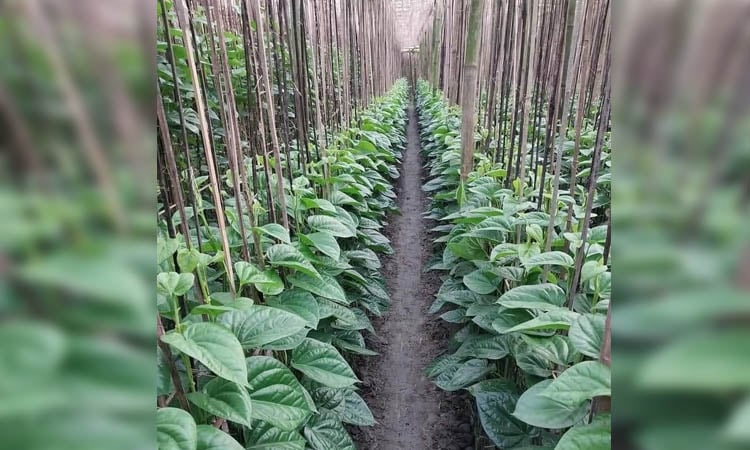News Flash
News Flash

By Md Aynal Haque
RAJSHAHI, Aug 22, 2025 (BSS) -Cultivation of sweet betel leaf in Rajshahi, renowned for its taste and aroma, has emerged as a highly profitable cash crop, increasing farmers' income, as well as supporting the local economy.
Sweet betel leaf accounts for 70 percent of total betel leaf cultivation and is the most popular type among farmers, Sirajul Islam, retired director of the Department of Agricultural Extension (DAE), told BSS.
Betel leaf cultivation is gaining popularity as it is more profitable and less costly than many traditional crops. Farmers are increasingly turning to it because the soil and climate of Rajshahi are ideal for cultivation.
The demand for betel leaf, chewed with betel nut for its stimulating effect, is rising. This helps local farmers economically while contributing to their socio-economic development.
After meeting local demand, surplus leaves are exported abroad. DAE sources said that the 72,764 farmers in the region contribute not only to the local economy but also to the country's export earnings.
Agricultural expert Islam said farmers choose betel leaf for its higher profitability when crops like paddy and jute yield lower returns. The growing betel leaf industry has also created many jobs.
Mostakima Khatun, Upazila Agriculture Officer of Mohanpur, said each kilogram of betel leaf sells for Taka 250 in local markets. Umme Kulsum, Deputy Director of DAE, said the district produced 76,151.82 tonnes of betel leaf on 4,499.23 hectares in FY 2024-25, earning Taka 1,561.9 crore.
In FY 2023-24, production was 72,330.34 tonnes from 4,311 hectares. Two types of betel leaves-sweet and sanchi-are cultivated in nine upazilas, but sweet betel leaf remains the top choice for both consumers and farmers.
Leaves take 5-6 months to mature and can be harvested every 8-10 days thereafter.
Monimul Hossain, a farmer from Bakshail village, Mohanpur, said he and his wife have been cultivating betel leaf for over 25 years. "We call it 'Sonar Pata' (golden leaves) because it is the most profitable crop," he said. He earned Taka 16 lakh from 30 katha of land.
Ali Hossain Riyad, another farmer from Mougachhi village, said he earns Taka 4-6 lakh from 10 katha of land.
Abdus Sattar, a betel leaf trader from Baghmara upazila, said local and global demand is immense. "I collect leaves from distant villages and sell them across the country. My monthly income is usually Taka 70,000," he said.
Abdul Hamid, a farmer from Chandapur village, Baghmara, said he became self-sufficient through betel leaf farming. Demand for Baghmara's leaves has risen in Bogura, Rangpur, and Dinajpur, and exports have expanded to Middle Eastern countries, especially Saudi Arabia.
Aloknagar has emerged as a major market, attracting wholesalers and retailers from different areas.
Dr Azizur Rahman, Additional Director of DAE, said betel leaf is not only consumed traditionally at weddings, birthdays, and Pohela Boishakh but also has medicinal properties. Its use in the pharmaceutical industry has strengthened Bangladesh's agricultural sector.
He added, "We are training farmers in scientific cultivation methods. If the government supports them sustainably, farmers can boost national economic growth and increase foreign exchange earnings."